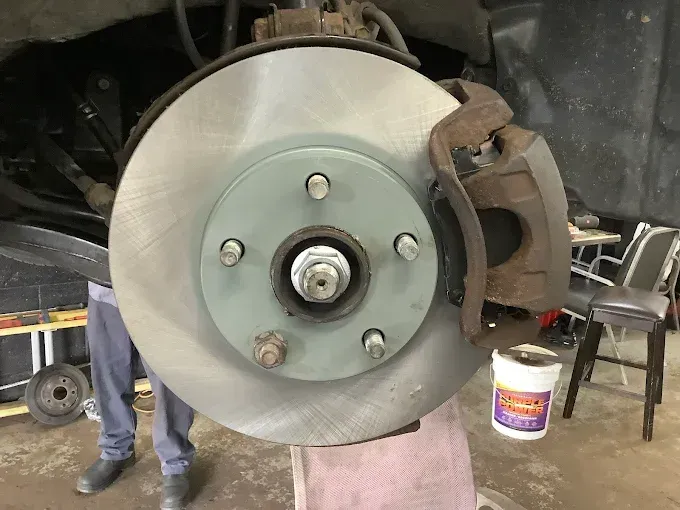Comprehensive Brake Services for Your Safety
Contact Us Now!
When it comes to your brakes, there’s no room for compromise. Whether you need a routine brake inspection, new pads and rotors, or something more complex, our team has you covered. We handle everything from squeaky brakes to full system overhauls, using only high-quality parts and the latest diagnostic tools to ensure peak performance and reliability.
Need help fast? Give us a call at (773) 625-5000 or visit our website to schedule your appointment. Your safety is our top priority, and we’re here to keep you confidently on the road, stop after stop.
Your vehicle's braking system is its most critical safety feature. At Champ's Auto Service, we understand that properly functioning brakes are non-negotiable for safe driving. We offer comprehensive brake services, from routine inspections to complex repairs, ensuring your vehicle stops reliably every time. Our certified technicians use high-quality parts and the latest diagnostic tools to keep your brakes in optimal condition.
How Your Car's Brakes Work
Modern cars primarily use two types of brake systems:
- Disc Brakes: Most common on front wheels (and increasingly on all four), disc brakes use a caliper to squeeze brake pads against a spinning rotor, creating friction to slow and stop the wheel.
- Drum Brakes: Often found on rear wheels, drum brakes use shoes that press outward against the inside of a spinning drum to create friction.

Both systems rely on hydraulic pressure, transmitted by brake fluid, to engage the braking components. The Anti-lock Braking System (ABS) is an advanced safety feature that prevents wheel lock-up during hard braking, allowing you to steer while stopping.
When Do You Need Brake Service? Common Warning Signs
Don't ignore these crucial indicators that your brakes need attention:
- Squealing or Squeaking: A high-pitched noise, especially when lightly applying brakes, often signals worn brake pads. Many pads have a built-in wear indicator designed to produce this sound.
- Grinding Noise: A harsh, metallic grinding sound indicates severely worn brake pads, where the metal backing plate is now rubbing against the rotor. This requires immediate attention to prevent further damage.
- Vibration or Pulsation: A shaking in the steering wheel or brake pedal when braking can indicate warped brake rotors, which are typically caused by excessive heat.
- Soft or Spongy Pedal: If your brake pedal feels unusually soft, or goes nearly to the floor before engaging, it could mean air in the brake lines, low brake fluid, or a master cylinder issue.
- Pulling to One Side: If your vehicle veers to one side when braking, it might be due to a stuck caliper, unevenly worn brake pads, or a brake fluid issue on one side of the system.
- Burning Smell: A strong chemical or burning odor, particularly after heavy braking, can signify overheated brakes.
- Brake Warning Light: The illumination of your dashboard brake warning light (often a circle with an exclamation mark or the word "BRAKE") indicates a potential issue with the braking system or low brake fluid. The ABS light signals a problem with the anti-lock system.
Our Comprehensive Brake Services
At Champ's Auto Service, our brake services include:
Brake Inspections: Thorough checks of all brake components, including pads, rotors/drums, calipers, brake lines, and brake fluid.
Brake Pad & Rotor Replacement: Replacing worn brake pads and resurfacing or replacing rotors as needed to ensure optimal stopping power.
Brake Fluid Flush & Replacement: Periodically replacing brake fluid (typically every 2 years or 24,000 miles) to remove moisture and contaminants that degrade braking performance and system integrity.
Caliper & Wheel Cylinder Service: Inspecting and servicing these critical components for proper operation.
Brake Line Repair: Addressing leaks or damage in the hydraulic brake lines.
ABS System Diagnostics & Repair: Diagnosing and repairing issues with your Anti-lock Braking System for enhanced safety.
The Importance of Regular Brake Maintenance
Regular brake maintenance extends the lifespan of your braking components, improves overall vehicle safety, enhances stopping performance, and can prevent more costly repairs down the line. It ensures your vehicle meets safety standards and provides peace of mind on every journey.
For reliable brake service and expert advice, trust the professionals at Champ's Auto Service. Contact us today to schedule your brake inspection.
Vehicles We Service
No matter what you drive, you can count on Champ's Auto Service for expert care. Our technicians are trained and equipped to service a wide variety of makes and models, including:
- Audi
- BMW
- Buick
- Cadillac
- Chevrolet
- Chrysler
- Daewoo
…and many others. Whether you own a domestic, European, or Asian vehicle, we're here to help keep your car running smoothly. If you don’t see your make listed, just give us a call—we’re always happy to answer questions about your specific vehicle.

